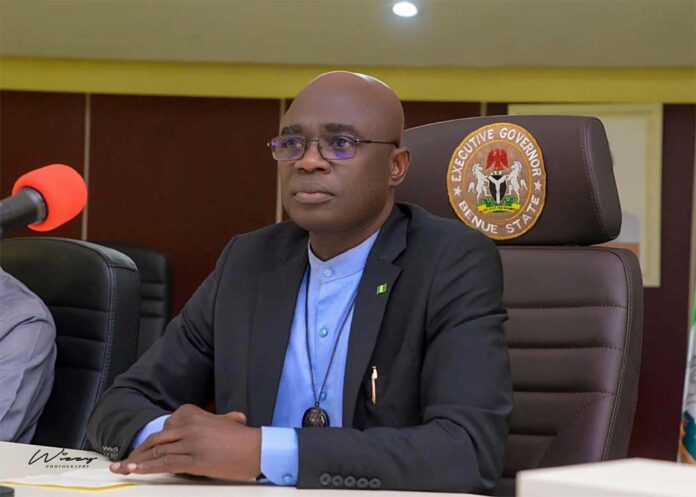The Benue State government has formally applied to withdraw from the suit that is asking the Supreme Court to declare the Economic and Financial Crimes Commission, EFCC, as an illegal organization.
Governor, Rev. Fr. Hyacinth Alia had on Wednesday, directed the Attorney General of the State and Commissioner for Justice, Chief Fidelis Bemsen Mnyim, to proceed on indefinite suspension for unilaterally joining Benue State as a plaintiff in the suit which was originally brought before the apex court by Kogi state.
Rev. Fr. Alia, who was irked by the development, noted that both the EFCC and the Independent Corrupt Practices Commission, ICPC, which may be affected by the suit, are anti-graft agencies that are currently helping the state to recover funds that were stolen from its treasury.
“No appointee is permitted to act unilaterally. No matter how pressing or urgent the issue is, one must resort to due consultations with me or appropriately brief me and seek my permission before acting, especially in a sensitive matter such as this.
“My administration is holding accountable those who embezzled money and drained our state dry. The EFCC and ICPC are assisting us in this effort.
“How can I now turn around and begin to challenge these watchdogs? I gave no permission for him to enter an appearance for the state. Because he acted on his own, I hereby suspend him indefinitely pending a satisfactory explanation of his actions,” the governor added in a statement that was signed by his Chief Press Secretary, Sir Tersoo Kula.
Meanwhile, it was learned that the suspended AG had before his sanction came to light, quickly applied for Benue state to be removed from the list of 18 other states that were cited as plaintiffs in the matter.
His notice of discontinuance, dated October 23, read: “Take notice that the Attorney-General of Benue state who is the 8th plaintiff hereby discontinues this suit against the Attorney-General of the Federation, the defendant.”
It will be recalled that three other states- Anambra, Adamawa and Ebonyi- had when the suit came up before the Supreme Court on Wednesday for hearing, also announced their decisions to withdraw from the matter.
The Attorney General of Anambra state, Prof. Sylvia Ifemeje, told the apex court that the state was no longer willing to be a part of the case which was originally instituted by Kogi state.
She disclosed that the state’s withdrawal notice was dated October 20.
Likewise, Adamawa state, through its own AG, Mr. J. I. Jingi, notified the apex court that it had on October 14, also filed a notice of withdrawal.
Ebonyi state, which was initially listed as the 18th plaintiff, through it counsel, Mr. Ikenna Nwidagu, equally applied to withdraw from the suit.
Their request to pull out of the case was not opposed by the AGF, Prince Lateef Fagbemi, SAN, who is the sole defendant in the matter.
Consequently, the apex court panel, led by Justice Uwani Abba-Aji, struck out the names of Anambra, Adamawa and Ebonyi state as the 9th, 16th and 18th plaintiffs in the suit, respectively.
Even though the suit, marked: SC/CV/178/2023, was originally brought before the court by Kogi state, however, the other states applied and were joined as co-plaintiffs while others filed applications for their own suit to be consolidated with the extant matter.
For instance, Osun state, through its AG, Mr. Oluwole Bada, applied to be allowed to consolidate its own grievance against the operations of the EFCC, with that of Kogi state.
Osun state told the court that it filed a separate suit to seek the same reliefs that Kogi state listed against the anti-graft agencies.
The states listed as plaintiffs in the matter included; Kebbi, Sokoto, Katsina, Jigawa, Oyo, Benue, Plateau, Cross River, Ondo, Niger, Edo and Bauchi, Taraba, Imo and Nasarawa.
The states, through their respective Attorneys General, argued that section 12 of the 1999 Constitution, as amended, was not complied with before the EFCC began its operations.
According to the plaintiffs, it was a mandatory provision of the Constitution that majority of the Houses of Assembly of States must vote and agree to the passage of the EFCC Act, insisting that it was not something that only the National Assembly was legally allowed to do.
They told the Supreme Court that none of the states was carried along before the EFCC was established by the then administration of President Olusegun Obasanjo.
They argued that the Supreme Court had in a decided case-law in Dr. Joseph Nwobike Vs Federal Republic of Nigeria, held that it was a United Nation Convention against corruption that was reduced into the EFCC Establishment Act and that in enacting this law in 2004, the provision of Section 12 of the 1999 Constitution, as amended, was not followed.
The plaintiffs maintained that since the due process was not followed before the EFCC Establishment Act was enacted, it cannot be applicable in states that never approved of it, in accordance with provisions of the 1999 Constitution, as amended.
They argued that any agency that was formed as a result of the Act, ought to be regarded as an illegal institution.
The states relied on the fact that since the 1999 Constitution, as amended, is the supreme law of the land, any Act of the National Assembly that is inconsistent with the Constitution, ought to be declared a nullity.
The apex court has already reserved the matter for judgement.

